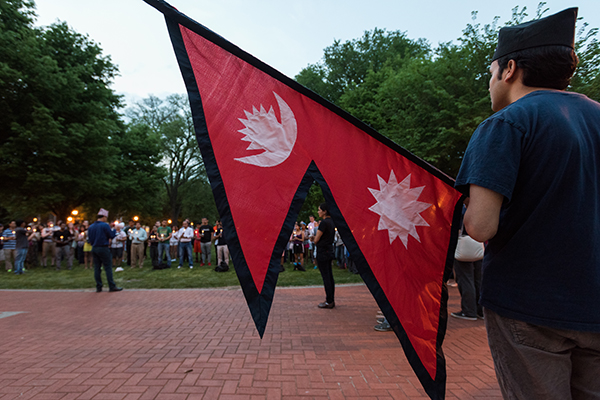
Research in Nepal
University's Disaster Research Center team travels to earthquake site
1:40 p.m., May 29, 2015--A team from the University of Delaware’s Disaster Research Center (DRC) has traveled to Nepal, where members are studying the social impact of the massive April 25 and May 12 earthquakes on communities there.
Each member of the team — two doctoral students, a postdoctoral researcher and a faculty member — is focused on a particular aspect of the situation, but the interdisciplinary DRC also takes a more wide-ranging view of the impacts of and responses to disasters by traveling to affected areas soon after the events have occurred.
Global Stories
Fulbright awards
Peace Corps plans
“We always go in with a very broad lens,” said Samantha Penta, a doctoral student in sociology, who is examining issues of how the disaster has affected medical decision-making in Nepal. She is gathering information about formal medical care, provided by both local and international medical workers, as well as informal care by friends and family.
The team’s schedule called for the researchers to arrive in the capital of Kathmandu and then to plan the rest of their two-week itinerary based on conditions on the ground.
“We have a very open agenda,” Daryl Yoder-Bontrager, a doctoral student in disaster science and management, said. “We’ll have to learn about travel times and distances before deciding how much work we’ll be able to do in the more remote villages.”
Yoder-Bontrager, who previously worked with a nongovernmental organization conducting administrative assessments in disaster areas, is now researching similar aspects of the situation in Nepal, focusing on multi-organizational coordination.
“Nepal will give me a chance to see relief efforts in a different context,” he said. “I’ll be looking at coordination in general and how governmental and nongovernmental organizations work together, how they make decisions and how working side by side affects their decisions.”
For DRC postgraduate researcher Sarah DeYoung, her interest is on the broad impact of the earthquake on communities and also on its impact on infant care, particularly infant feeding. Infant formula is often donated to disaster areas, she said, and the allocation of formula can affect decisions such as whether babies are fed breast milk and whether wet nurses are used.
Faculty member Rachel Davidson is in Nepal to examine some of the impacts of the earthquakes on infrastructure. A professor of civil and environmental engineering at UD and a core faculty member with the DRC, she is working with a separate team from the Earthquake Engineering Research Institute, a national, nonprofit technical society based in California.
“Our group as a whole is much more engineering-focused, looking at buildings — especially those where there was a fair amount of retrofitting done earlier, to assess how that worked,” said Davidson, who called the interdisciplinary nature of the DRC “one of its biggest strengths.”
In Nepal, she is looking not just as buildings but also at how the disaster affected such key services as water and power supplies and waste disposal capability.
When the team returns to UD, members will write reports and make presentations to interested agencies and scholars, although the DRC’s mission is to develop scientific knowledge and information that can be applied to planning and policy making, not to advise agencies directly.
Follow-up visits to Nepal might occur if a particular area of research would benefit from additional in-person data collection, said Tricia Wachtendorf, associate professor of sociology and of women and gender studies and associate DRC director.
About the Disaster Research Center
The DRC, the first research center in the world devoted to the social scientific study of disasters, was established in 1963 at Ohio State University and moved to UD in 1985. It is known for its capacity for quick-response field research and a culture of collaboration among faculty, staff and graduate and undergraduate students.
Since the center began, researchers have conducted some 700 field studies in communities throughout the United States and internationally, following a broad range of disaster types, including hurricanes, floods, earthquakes, tornadoes, hazardous chemical incidents, plane crashes and civil disturbances.
Article by Ann Manser








